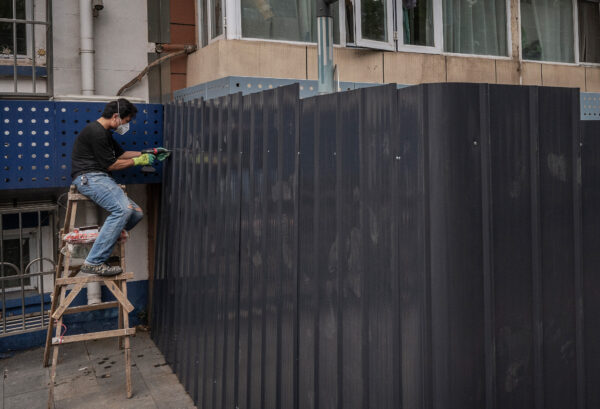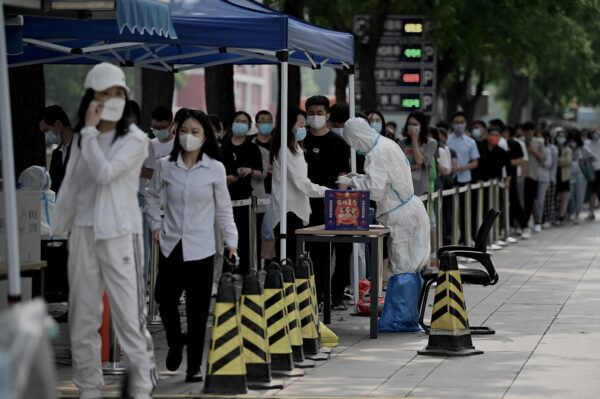
A medical worker in a protective suit collects a swab from a resident at a makeshift nucleic acid testing site, during a mass testing for COVID-19 in Chaoyang district of Beijing on June 13, 2022. (Carlos Garcia Rawlins/Reuters)
By
After a short break, Beijing has resumed mass COVID-19 testing.
A flare-up of COVID-19 infections linked to a nightclub prompted the city to rescind an earlier decision to ease restrictions that had put the capital into a partial lockdown for more than a month.
The populous Chaoyang district is testing its 3.5 million residents three times starting on June 13. The neighboring Fengtai district also kicks off a three-day mandatory screening of people living in the areas deemed at risk.
Beijing officials said the new curbs come as a result of a recent wave of infections centered around a popular 24-hour bar, Heaven Supermarket Bar, which resumed operation less than four days ago.
After a man who frequented the pub twice in two days tested positive for COVID-19 on June 9, infections linked to the venue have been registered in 14 of Beijing’s 16 districts, officials said.
More than 10,000 people were identified as close contacts of the bar’s customers, state-run media outlet Beijing Evening News reported. Their residential compounds have been placed under lockdown.
“The latest outbreak is fierce and difficult to contain,” Meng Rui, deputy chief of Chaoyang district, where the bar is located, said at a June 13 briefing.
As of June 12, a total of 228 cases linked to the club have been recorded. More than 80 percent of them are the bar’s patrons. The rest are staff or people who had contact with customers.
However, the Chinese regime’s official count has consistently come into question by residents and experts who point to Beijing’s history of downplaying and covering up information about outbreaks across the country.

A worker drills a sheet into place on a barrier fence as he installs it outside an apartment that was locked down after a recent COVID-19 outbreak in Beijing on June 13, 2022. (Kevin Frayer/Getty Images)
While the West relaxes COVID-19 restrictions, choosing to live with the virus, the Chinese regime is determined to eliminate transmission among communities entirely. Its zero-COVID policy, which relies on mass testing, prolonged lockdowns, and centrally isolating everyone at risk, has left Chinese cities stuck in a cycle of closing and reopening.
The on-again off-again lockdowns have put huge strains on the country’s economy and stirred rising discontent among a population growing weary of indefinite movement restrictions and testing mandates.
The reintroduction of COVID-19 curbs in major cities, such as Shanghai and Beijing, shows how difficult it is to return to normal life. Shanghai, a city of 25 million people that reemerged from a two-month-long lockdown on June 1, ordered a new round of mandatory screening in all but one of the city’s 16 districts starting on June 11.
In Beijing, drinking and dine-in services were allowed to resume on June 6 after COVID-19 restrictions had sealed residents indoors and shut stores for a month.
But only 3 1/2 days later, officials reclosed pubs, internet cafes, and karaoke parlors in Chaoyang district, according to a June 9 statement from the district’s culture and tourism bureau, after the first cases were found linked to Heaven Supermarket Bar.
The pub is located in Sanlitun, a popular area known for nightlife and shopping malls. The entire area has since been shut down until further notice. Reuters reported that several customers and staff were locked in Heaven Supermarket Bar while checks were carried out, citing an unnamed source within the authorities.

People line up at a swab collection site to test for COVID-19 in Beijing on June 13, 2022. (NOEL CELIS/AFP via Getty Images)
On June 13, long, snaked lines reappeared in some areas of Beijing as mass testing was underway. Lines at some testing spots were longer than 330 feet (100 meters), according to Reuters.
A Beijing resident surnamed Peng told The Epoch Times that he worried the lines for testing could increase the risk of contracting the virus.
On social media, residents are expressing their frustration over the renewed restrictions. Some questioned the meaning of Beijing’s zero-COVID policy, given that the majority of new infections had only mild or no symptoms.
“I don’t know how history will record this ridiculous time. … So many people are wasting huge social resources to do a meaningless job,” a user wrote on Twitter-like Weibo, referring to the zero-COVID playbook.
“What’s next, continue to close? How can everybody survive? Everything was stopped, but did mortgages stop? … What about rent?” another user said.
“What I’m afraid of is not COVID-19 now, but the curb measures,” a third user said.
Fang Xiao and Li Shanshan contributed to the report.